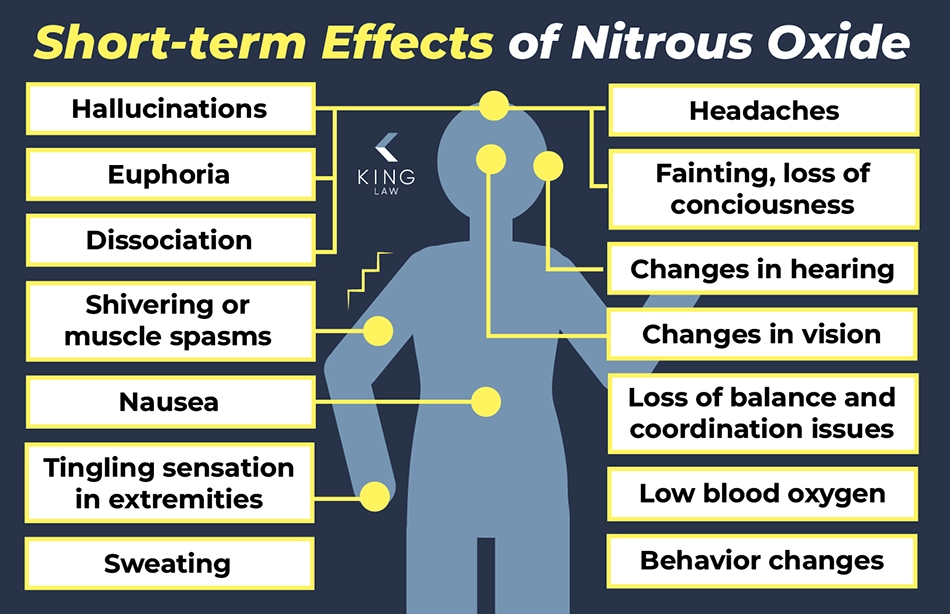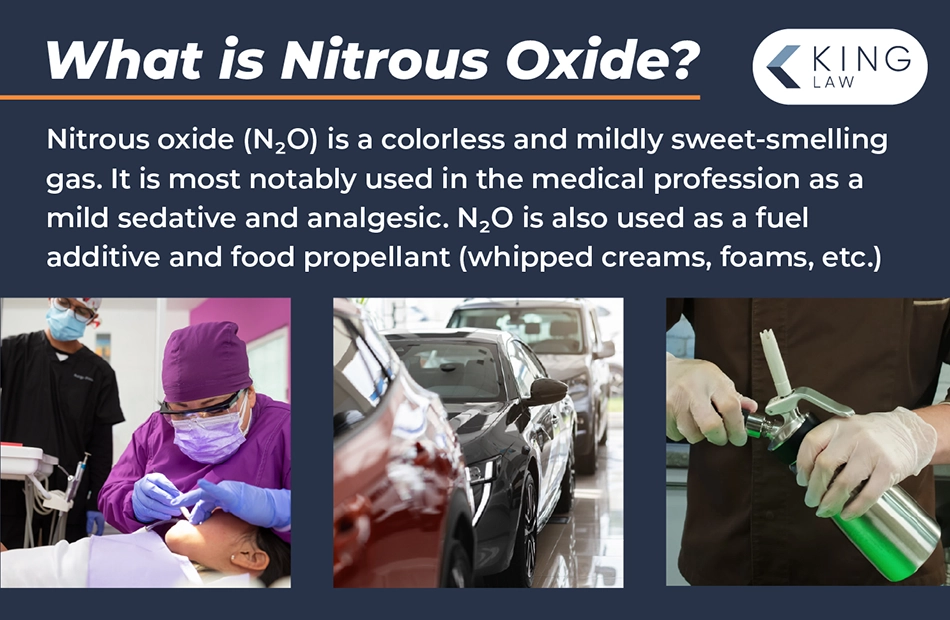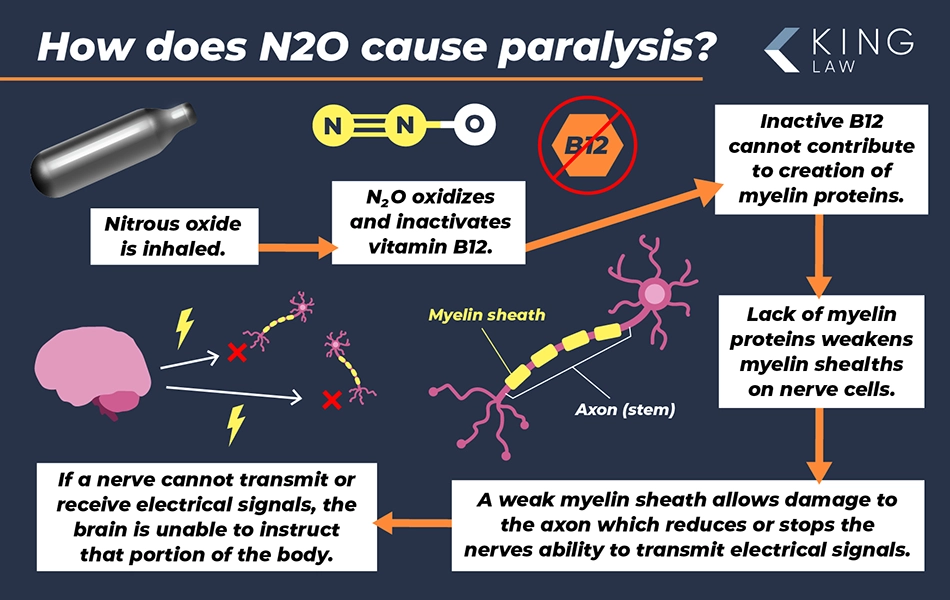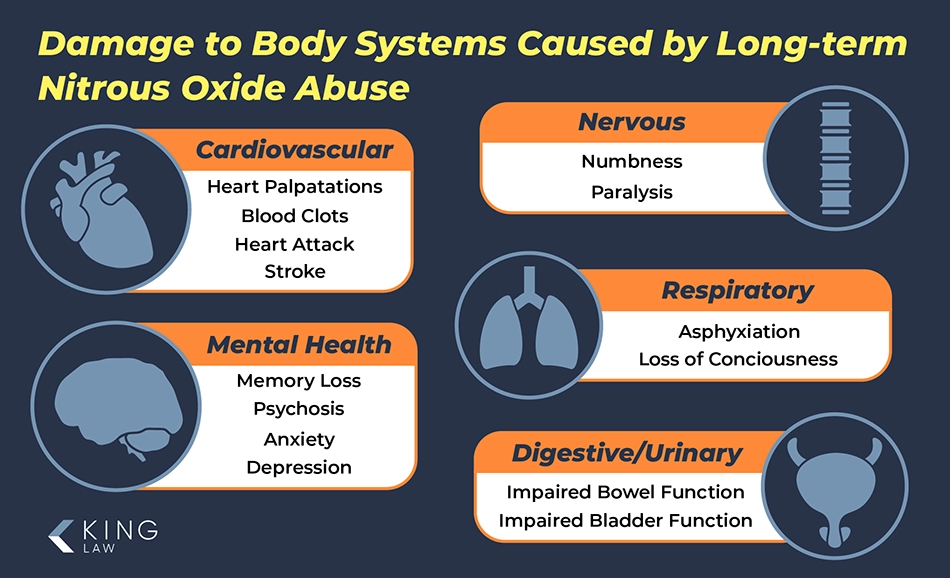Complete the form below to see if you qualify for a Whip-It Lawsuit

Nitrous oxide is a popular recreational drug among teenagers, adolescents, and young adults. Although many young people think the drug is relatively safe, some of its side effects are serious and life-threatening. Side effects of nitrous oxide use include numbness, breathing problems, giddiness, floating sensations, paralysis, and uncontrollable muscle movements.
Some of these side effects are short-lived and enjoyable, while others can last for a long time and put someone’s life in danger. Some people who use nitrous oxide (also known as nangs, NOS, galaxy gas, N2O, hippy crack, and whippets) to get high are suffering severe injuries. These injuries might occur when someone uses nitrous oxide for the first time. However, the longer someone uses this drug, the more likely they are to experience its serious side effects.
About the Nitrous Oxide Side Effects Lawsuit
What Are the Side Effects of Inhaling Nitrous Oxide?
Effects of Nitrous Oxide Abuse
How Long Do the Side Effects of Nitrous Oxide Last?
Can You Recover From Nitrous Oxide Abuse?
Compensation to Help in Recovery
Talk to a Lawyer to See if You Have a Nitrous Oxide Abuse Claim
What Are the Side Effects of Inhaling Nitrous Oxide?
When inhaled, nitrous oxide (N2O) works as a mild sedative and pain reliever. When it is administered by a medical professional, it has relatively few side effects. However, when people inhale it for fun, nitrous oxide can have numerous negative side effects. Some of these side effects last a short time and are enjoyable, such as the immediate rush and giddy feeling many people experience when they inhale it. However, other side effects can be negative and last for a long time, including blood clots, frostbite, and problems walking or moving one’s body.
Some of these negative side effects happen because your body cannot get the oxygen and vitamin B-12 it needs to function normally. Additionally, the gas and the canisters it comes in are extremely cold, which can give you a cold burn (frostbite).
Short-Term Side Effects
Nitrous oxide can cause many different temporary (short-term) side effects. Lots of people who use nitrous oxide for fun may do so because they experience funny or enjoyable changes when they inhale it. However, some of the short-term side effects of N2O are less enjoyable. Here are some of the short-term effects of nitrous oxide:
- Hallucinations (seeing or hearing things that are not really there)
- Euphoria (the feeling of a joyful rush or of being high)
- Feeling like you are floating and are not connected to your body (sometimes called dissociation)
- Vision or hearing changes (sounds may appear clearer or muddier; the world may look more brightly colored)
- Changes in how you think, feel, or act (like laughing a lot or thinking thoughts that are funny or do not make sense)
- Nausea (feeling like you want to throw up)
- Shivering or muscle spasms (feeling intensely cold or having your muscles move without you moving them)
- Headaches
- Sweating a lot even though you are not hot
These side effects may show up right away, and it may take up to 15 minutes for the person to feel like they are themselves again. Because the high from N2O does not last very long, many people keep using it because they are drawn to the feeling they get.

Long-Term Side Effects of Nitrous Oxide
If you use a high dosage (or concentration) of nitrous oxide, it can cause a number of long-term side effects. Using nitrous oxide multiple times a day over many weeks or months can also harm your body and mind.
Long-term side effects of nitrous oxide include the following:
- Paralysis (not being able to move parts of your body)
- Numbness in your body (such as your hands, feet, legs, or face)
- Not being able to control your muscles (such as to walk, pick something up, or put something down)
- Brain, spinal cord, or nerve damage
- Frostbite injuries that cause lifelong scars
- Dangerously low blood pressure
- Blood clots, which can cause even healthy and young people to have a stroke
These long-term effects can completely change someone’s life, and the symptoms may not improve or completely heal with time. Some people may experience these complications after the first time they use nitrous oxide. Others may not have these side effects until they have been using N2O for a long period of time.
Side Effects of Too Much Nitrous Oxide
People can use too much nitrous oxide for a number of reasons, and it can have dire consequences. The high people get from nitrous oxide can come on very strongly within seconds of inhaling it; however, it does not last long. Because of this, lots of people who use nitrous oxide may start out by using it every now and then at low doses, then increase how much and how often they huff it. However, this raises someone’s risk of experiencing bad and even life-threatening complications from long-term nitrous oxide abuse. Many people are suing nitrous oxide companies because the companies did not tell them they could get hurt if they inhaled these products.
Is Nitrous Oxide Bad for You?
Recreational use of nitrous oxide can be dangerous. Nitrous oxide can be very bad for your body and mind if you use it for fun outside of a medical setting. When you take nitrous oxide yourself, you are getting it in higher doses and concentrations than what may be safe for you.
However, there are safe ways for someone to take nitrous oxide. For example, nitrous oxide is safe if a dentist is using it in low doses to help make a patient comfortable before a procedure. Part of the reason for this is that the dentist gives the patient lots of oxygen mixed in with the N2O, so the patient’s body and brain get enough oxygen.

How Bad is Nitrous Oxide for the Brain?
Nitrous oxide can be very bad for your brain and brain development, leading to permanent brain damage or death. Nitrous oxide stops oxygen from getting to your brain. When this happens, your brain does not have the air it needs to work properly. A lack of oxygen due to nitrous oxide can cause someone to have seizures, pass out, or even die.
Another reason is that nitrous oxide can cause a vitamin B-12 deficiency (meaning your body does not have enough of it). A vitamin B-12 deficiency may keep your nerves and spinal cord from working properly. Sometimes, doctors will not be able to undo the damage that nitrous oxide does to your brain, nerves, and spinal cord.
Are Whippets Bad for You?
Whippets and Whip-its! have nitrous oxide in them, and they are the same thing as regular nitrous oxide chargers. So, whippets can be just as bad for your body and mind as nitrous oxide. Whippets can cause the same types of long-term and short-term side effects as nitrous oxide.
Is Galaxy Gas Dangerous?
Galaxy Gas is a brand name for a popular type of nitrous oxide canisters. Galaxy gas can be very dangerous. The side effects of Galaxy Gas are the same as for nitrous oxide. These side effects can include short-term effects (like feeling spaced out or nauseous) and long-term effects (like paralysis or muscle twitches). People who were hurt by Galaxy Gas are filing lawsuits to get a settlement to treat their physical injuries.
Effects of Nitrous Oxide Abuse
The dangerous effects of nitrous oxide can increase as someone abuses more and more of the drug. Some of the complications that people experience after using nitrous oxide include the following:
- Asphyxiation (not being able to breathe)
- Blood clots
- B12 deficiency (your body needs B-12 for your brain and nerves to talk to the rest of your body)
- Frostbite and cold burns
- Issues using the bathroom (not being able to control when you pee or poop)
- Passing out
- Numbness or tingling
- Fast, slow, or irregular heartbeat
- Paralysis (not being able to feel and move parts of your body)
- Seeing or hearing things that are not real
- Being paranoid or constantly feeling like people are out to get you, including symptoms of schizophrenia
- Feeling depressed all the time
- Not knowing what is fake or real
- Sudden death
Because the high from nitrous oxide does not last long, it is common for people to use it more and more often. As you bump up how often you use nitrous oxide, you may build up a tolerance, meaning it takes more or stronger N2O for you to feel a rush or high. However, the longer that you use nitrous oxide, the more likely you are to experience negative side effects. If people use enough nitrous oxide, they can also overdose.
Vitamin B-12 Deficiency
Using nitrous oxide for fun can cause you to not get enough vitamin B-12. Vitamin B-12 is something your body needs to send messages to and from your brain, nerves, muscles, and other parts of your body. When it does not have vitamin B-12, these messages go to the wrong place or are not sent at all.
Someone who does not have enough vitamin B-12 may not be able to feel or use their legs, feet, hands, arms, or other parts of their body. The treatment for conditions caused by this deficiency may involve stopping nitrous oxide and taking extra vitamin B-12. However, not everyone with vitamin B-12 issues from nitrous oxide recovers from it.
Frostbite and Cold Burns
Frostbite and cold burns are another serious side effect of using nitrous oxide. The symptoms of frostbite from nitrous oxide include:
- A hoarse voice
- A patch of skin that is waxy, white, or a different color than it was before
- Problems swallowing or breathing
- Blisters or peeling skin in the mouth
- Numbness or tingling in the mouth
Nitrous oxide is well below freezing in the can (even as low as 40 degrees below zero), and it is still extremely cold when it leaves the canister. When the gas or the can touches your body, the difference in temperatures can instantly cause frostbite and cold burns. These burns may show up on your mouth, hands, fingers, lips, legs, or anywhere else that comes into contact with the gas or charger.
Psychiatric Disturbances
Nitrous oxide can cause psychiatric disturbances. It can affect all of your senses and change the way you feel, think, act, remember, and process information. Nitrous oxide blocks your brain from getting oxygen and vitamin B-12, which it needs for it to work properly.
When your brain does not have these things, it can cause you to experience dangerous and sometimes life-changing mental health problems. These problems include thinking that people are out to get you when they are not and feeling extremely sad or anxious all the time. You may also be unable to remember things that are important to you, and not be able to tell the difference between what is real and what you have imagined.
Numbness
Another side effect of N2O is numbness, which can happen for a couple of minutes, hours, days, or even the rest of your life. Nitrous oxide can stop your body from getting and using vitamin B-12. Without this vitamin, your body cannot send and receive signals normally. Because of this, areas of your body may feel numb or tingly. This may also be a sign of frostbite, especially if you felt sharp pain or coldness in the area right before the feeling went away completely.
Paralysis
N2O can also cause all or some of your body to become paralyzed, meaning you cannot move it on your own. For example, you may suddenly lose the ability to move your legs or arms after you inhale laughing gas. For some people, the paralysis may last for a little while until the nitrous oxide wears off or they get vitamin B-12 treatments. However, many teenagers and young adults are experiencing lifelong paralysis after huffing products like galaxy gas alone or with their friends.

Impaired Bowel and Bladder Function
Nitrous oxide may make it harder for you to control when waste leaves your body. This happens because N2O may prevent you from controlling the muscles needed to hold in or release urine or poop. Bladder or bowel problems may also happen because your spinal cord was damaged by a lack of vitamin B-12. Spinal cord injuries may cause the lower half of your body to become paralyzed, which may keep you from controlling those areas.
Heart Palpitations
Nitrous oxide can change the pace of your heartbeat, meaning it can make your heart beat too fast, too slow, or in strange, dangerous rhythms. N2O also raises the levels of a hormone (homocysteine) needed for your body to keep your heart beating as it should. Incorrect levels of this hormone may put you at a higher risk of a heart attack or other heart problems.
N2O may also stop your heart and lungs from working correctly, which means you may not get the air you need to stay alert and alive. Some healthy teenagers and young adults have even had heart attacks and died after using high doses of nitrous oxide.
Blood Clots
Blood clots are another possible side effect of nitrous oxide. Blood clots (also called embolisms) are portions of your blood that clump together and may completely block blood from flowing from one place to another in your body.
Blood carries important nutrients and oxygen so your muscles, brain, nerves, and cells have what they need to survive. Without proper blood flow to your brain, for example, you may experience a stroke. A stroke can cause permanent damage to your brain and impact your ability to talk, think, move your body, or breathe on your own. Signs of a blood clot include changes in your vision, sudden numbness or coldness, problems talking, and difficulty lifting your arm.
Loss of Consciousness, Asphyxiation, & Death
Nitrous oxide cuts off the oxygen supply to your brain, which can cause your body to protect itself by passing out. When you faint, you are also more likely to hit your head or another part of your body. Huffing large amounts of N2O or taking NOS multiple times every day can strain your body and increase your chances of having breathing problems or passing out.
People who inhale nitrous oxide directly from the can are at a higher risk of suffocation or death because they are not getting enough oxygen. Sometimes, people who have experienced breathing problems do not recover, and they die because they cannot get air into their lungs or to their brain.

How Long Do the Side Effects of Nitrous Oxide Last?
The side effects of nitrous oxide that people tend to enjoy may only last a few minutes before they start to wear off. These side effects include dizziness, giddiness, dissociation (feeling high), and laughing fits. Some of the negative and unpleasant effects may be short-lived as well. For example, minor nausea, tiredness, or numbness may go away shortly after the person stops inhaling nitrous oxide.
However, the long-term and more concerning side effects may last for a long time. For example, frostbite injuries from nitrous oxide may take days or weeks to heal. Sometimes, severe side effects may never go away, and the person may be forced to live life with a permanent injury (like not being able to walk).
Can You Recover From Nitrous Oxide Abuse?
People who abuse or are addicted to nitrous oxide can find ways to overcome these challenges and the side effects they experience. Nitrous oxide does not have anything in it that physically hooks you, like the nicotine in cigarettes and vapes do. However, many people are attracted to the physical and psychological high they get when they use the gas. So, they may become addicted to those feelings and keep using nitrous to try to keep feeling good. Unfortunately, using a lot of nitrous oxide or using it every day can cause the person to suffer from serious side effects and change their lives forever.
Treatments are available, though, to help people treat the physical injuries they have from the nitrous oxide side effects. For example, one young woman learned how to walk again after nitrous oxide misuse damaged her brain, but she still had dead spots in her brain even after she got treatment. Other patients worked with their doctors to get special vitamin B-12 treatments to help reverse the damage to their nerves and bodies after heavy nitrous oxide use.
Nitrous Oxide Abuse Treatment
The treatments for nitrous oxide abuse and side effects depend on what the person is experiencing. The first step is to contact a medical professional and tell them that you are experiencing side effects of misusing nitrous oxide. They can examine you, help you figure out what issues the N2O is causing, and tell you what steps you can take to medically heal from these. Nitrous oxide side effects, even the long-term or severe ones, have a much better chance of being reversed if you get help early on or when you need it.
There are also addiction programs that can help you find ways to wean off nitrous oxide and get you healthy again. These are judgment-free zones that are not going to look down on you or lecture you for using whipped cream chargers for fun. They understand why people turn to these activities and how our brains can work against us and get us to keep doing things even if we do not want to. Get treatment when you recognize a problem and are curious about how to make a positive change in your life.
Compensation to Help in Recovery
Young people and teenagers (with the help of a parent or guardian) are filing lawsuits after they experienced nitrous oxide side effects. Many people think that nitrous oxide companies should have done more to protect teenagers and young people. They believe these companies targeted teenagers and misled them into thinking nitrous oxide was a safe way to have fun with their friends or at parties.
The people who are filing lawsuits are asking for money (a settlement) to cover the costs of treating their nitrous oxide injuries. This includes money to pay for medical bills the person also paid, as well as for upcoming treatments.
Talk to a Lawyer to See if You Have a Nitrous Oxide Abuse Claim
Nitrous oxide side effects can be very uncomfortable, scary, and frustrating. It is not your fault that you used nitrous oxide for fun, and you may be able to get money from the companies that made the products you used. For example, Whip-it companies are being sued because people do not think they were honest about the side effects of their N2O chargers.
If you are ready to learn more about your legal options, call King Law today at (585) 496-2648 or fill out an online contact form. We have intake specialists who will facilitate your case. We do not charge any money for you to talk to us, and you only owe us money if we secure a payout for you.

